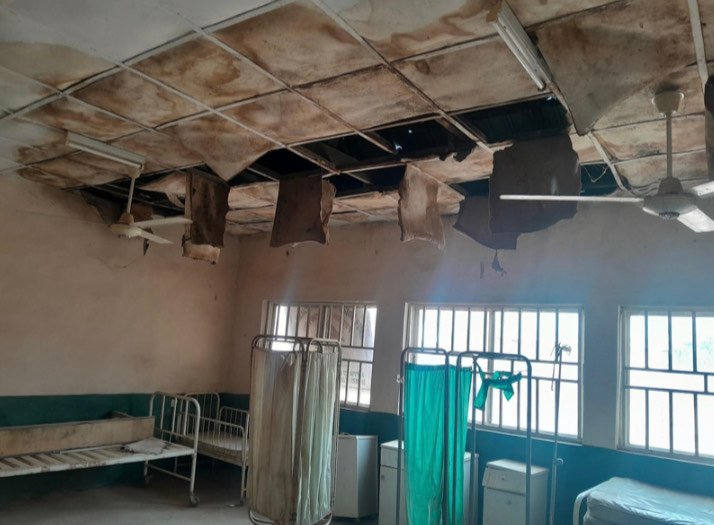This is the second in a two-part series uncovering the collapse of Sokoto State’s healthcare system, despite multi-billion naira allocations. You can read the first part here.
_______________
After completing his studies at the College of Health Sciences, Muhammad Kabir (real name withheld for safety) set out with a goal to serve. Eager to gain hands-on experience, he chose to volunteer at Gidan Bubu Health Clinic, situated in Gidan Bubu village of Wamakko Local Government Area of Sokoto state.
Though the decision came with challenges, Kabir was hopeful. Being from Wamakko, he knew the place, and as a trained health student, he was aware that primary health care facilities are supposed to have staff quarters. So when he arrived at Gidan Bubu, he wasn’t worried about accommodation. But the reality that met him was far from what he expected.
The staff quarters were a picture of what they should be: crumbling, neglected, and unsafe. With no habitable room available, Sanusi Dauda, the clinic’s only staff member and resident of Ilela, had resorted to sleeping inside the health facility itself. But the clinic’s only volunteer, Kabir, tried to make the best of the situation by “managing” one of the barely livable rooms.
Later, the volunteer discovered he was not the only one using the dilapidated space. Unwelcome visitors, including criminals and miscreants, frequently turned the staff quarters into their den, using them to smoke and loiter when no one was around. Kabir lived in constant fear but stayed committed to serving the people.
One day, he decided to visit his mother in Wamakko. It was a short trip, one that should have brought comfort. But when he returned, his worst fears had come true: the only door to his room had been broken. Everything he owned, including clothes, a small amount of money, and personal items, was gone.
“The criminals broke the only surviving door and carted away all the volunteer’s belongings,” said Sanusi Dauda, his voice heavy with frustration. We seriously need security personnel for the facility’s safety and our lives. The miscreants have turned the staff quarters into their smoking area and carted away anything valuable in the rooms.”
The broken door to Kabir’s room is in the staff quarters of the Gidan Bubu facility. Credit: Shereefdeen Ahmad
Kabir came to Gidan Bubu with a dream to serve, heal, and give hope. But instead, he became a victim of a broken system—a health facility with no security, a shelter that offers no safety, and a state that too often forgets its clinics in rural communities.
When The Liberalist visited the facility in March this year, the staff quarters were in a state of total abandonment and disrepair, reflecting the broader neglect that plagues the facility. Once intended to house medical personnel and ensure their presence around the clock, the quarters now symbolise their original purpose, broken, vandalised, and overtaken by criminal elements.
Inside the building, massive cracks run across the walls, a clear indication of profound structural weakness. The entrance door hangs off its hinges, barely standing after what seems to have been a forceful break-in. Rubble and cigarette butts litter the floor, and debris from collapsed parts of the building is scattered all around. The atmosphere was dark, musty, and unsafe for habitation. Everything of value was stripped or carted away from the window bars to the fittings.
The entrance door to the staff quarters. Credit: Shereefdeen Ahmad.
Outside, the compound is taken over by weeds and unkempt vegetation, with wild plants growing undisturbed across the walkway. The roof is partially detached, exposing interior parts to the elements. The quarters have not seen any form of maintenance in years.
Worse still, the building has been hijacked by some miscreants in the community, who now use it to smoke weed and engage in other illicit activities. With no security personnel stationed at the health center, there is no one to guard or monitor the premises. All valuable items, including windows, doors, furniture, and electrical fittings, have been carted away, leaving the facility bare and vulnerable.
Outside the staff quarters. Credit: Shereefdeen Ahmad
According to the minimum standards of the National Primary Health Care Development Agency (NPHCDA), a functional primary healthcare centre is supposed to have at least two security personnel on duty to safeguard the medical equipment and staff accommodations. However, in this case, the absence of security has opened the quarters to abuse, vandalism, and crime. This poses not only a threat to the safety of potential staff but also undermines any future efforts to revitalise the facility.
Gabriel Oke, a public health expert and founder of Medlabconvo, an organisation advocating for improvements in Nigeria’s healthcare system, emphasises that revitalising healthcare in rural communities requires the government to enhance welfare packages, bonuses, and allowances for staff working in those areas. He argues that without adequate incentives, it is difficult to attract and retain qualified professionals in remote locations where living and working conditions are often unfavourable.
This issue is particularly evident in Sokoto State. According to the MyPHC Report, more than 60 percent of Primary Health Care (PHC) staff stated no system exists to recognise or reward their contributions.
Inside Gidan Bubu Health Clinic
The facility itself stands as a grim symbol of neglect and systemic decay. It is barely habitable, with its ceiling panels sagging dangerously, some torn off completely, and others blackened with mould and rot. Rusty, dilapidated beds with missing mattresses line the stained walls, while the torn privacy curtains offer no real cover or dignity.
Large potholes disfigure the cracked concrete floor, posing hazards to patients and staff. The ceiling fans are barely intact, and the poor lighting casts a dull, gloomy shadow over the entire room. Equipment is outdated, and the overall environment is unsanitary and unsafe for medical care. This centre, meant to be a place of healing, now mirrors abandonment and despair, an indictment of the government’s failure to prioritise basic healthcare infrastructure in rural communities.
A ward in Gidan Bubu Health Clinic. Credit: Shereefdeen Ahmad
The facility lacks basic infrastructure, essential drugs, and qualified personnel, falling far short of the minimum standards set by the NPHCDA.
According to the NPHCDA’s “Minimum Standards for Primary Health Care in Nigeria,” a standard PHC should have at least 24 staff members. This includes a medical officer, a community health officer, four nurses or midwives, three community health extension workers(CHEWs), six junior community health extension workers (JCHEWs), a pharmacy technician, an environmental officer, a laboratory technician, and medical records personnel, along with support staff such as attendants, security, and maintenance workers.
A facility is also expected to have a well-equipped open ward, a labour room, children’s and female wards, a doctor’s office, staff quarters, an ambulance, and adequate medical supplies for immunisation, preventive, and basic curative care.
Recent data from Orodata Science and Civic Tech, which uses data and research to improve institutional reforms in Nigeria, shows that 74 percent of PHCs in Sokoto have damaged hospital beds. The report further revealed that 25 of 53 facilities surveyed in 2024 are in poor condition. This highlights the grim reality of the primary healthcare system in Sokoto state.
A ward in Gidan Bubu Health Clinic. Credit: Shereefdeen Ahmad
“We don’t have any source of water here. Whenever I have a water-related issue, I must send someone to buy water from the village. The installed tap has never worked, not even once,” Sanusi Dauda lamented.
Launched in 1988 to enhance access to basic health services, PHC is a Federal Government initiative to deliver healthcare at the grassroots level. It focuses on key areas such as immunisation for babies and toddlers against major communicable diseases and maternal and child health services.
However, a large portion of PHCs in Nigeria are not fully functional, with estimates suggesting that between 80 and 90 percent are unable to provide essential healthcare services to the communities they are meant to serve. Despite efforts by the NPHCDA, the reality remains dire: only about 20 percent of Nigeria’s over 30,000 PHC facilities are fully operational. The rest suffer from challenges such as inadequate staffing, poor distribution of health workers, substandard service delivery, dilapidated infrastructure, and a lack of essential medicines.
In Gidan Bubu, residents call for renovation and maintenance of the only healthcare facility serving more than three surrounding villages.
“It is not easy to go to the town to treat common illnesses,” said Aisha, a resident, echoing the concerns of many. “We are begging the government to please renovate this facility for us.”
In an interview with The Liberalist, Dr. Umar Faruq Abubakar, the Sokoto State Commissioner for Health, affirmed that the government is working to improve rural healthcare delivery.
“I don’t want to be sensitive to you, but I am just telling you we are putting several policies in place to ensure adequate mobilisation, continued retention, and protection of rural healthcare delivery across the state,” he stated.
Meanwhile, in an attempt to improve healthcare delivery in rural communities, the Commissioner announced a mandatory two-year rural service for all state-sponsored health professionals. The new policy requires all state-sponsored health workers to serve exclusively in rural areas for two years without the option of transfer. This development came after the publication of the first part of this story.
Lawal Jamiu, a northern-based public health analyst, stressed the importance of public-private collaboration in addressing these challenges.
“It is vital to foster partnerships with the private sector and non-governmental organisations (NGOs). The government cannot shoulder the burden of rural healthcare revitalisation alone. Collaborative efforts focused on infrastructure upgrades and service improvement are essential for sustainable progress,” he said.
Multiple attempts to reach Dr. Larai Aliyu, Executive Secretary of the Sokoto State Primary Health Care Development Agency (PHCDA), via phone calls and messages were unsuccessful, as she did not respond.
____________
This story was produced for the Frontline Investigative Program and supported by the Africa Data Hub and Orodata Science.














